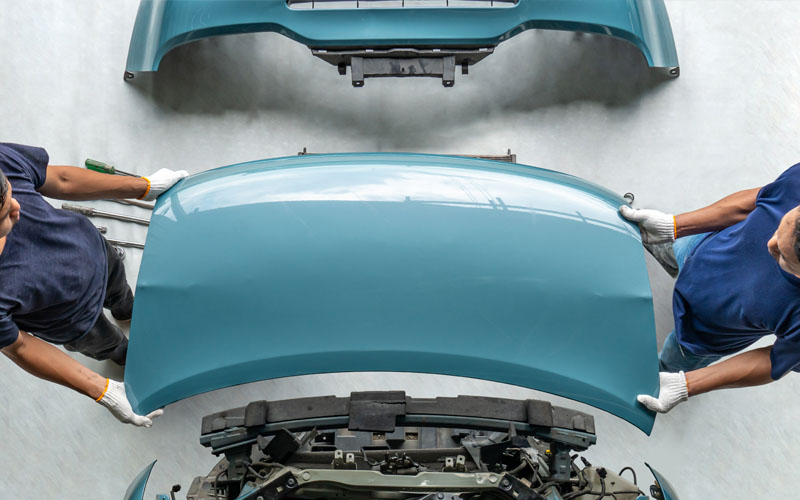Do Auto Body Shops Report Damage to Insurance? What You Should Know
You take your car to get a dent fixed—but does that visit automatically alert your insurer? The relationship between auto body shops and insurance companies isn’t always as straightforward as it seems. Before scheduling that repair, there’s something you need to understand about how information is shared—and what it could mean for your premiums.
TL;DR:
Auto body shops do not automatically report damage to insurance; they only get involved if you file a claim and request their assistance. If you use insurance, shops work with adjusters to document, estimate, and verify repairs, sometimes submitting supplemental claims for hidden damage, with insurers often paying the shop directly. If you pay out of pocket, repairs stay off your insurance record, keeping premiums unaffected—an option best for minor damage below your deductible, though warranty or lease agreements may require disclosure. While most shops don’t report directly to Carfax, repairs may still appear in databases through insurance claims, police reports, or dealerships.
Your car deserves the best—Book your estimate at a car body shop in Brooklyn! 📋

Do Body Shops Automatically Report Damage to Insurance?
No, auto body shops do not automatically report damage to your insurance. Reporting only happens if you choose to file a claim and request the shop’s help in working with your insurer. Most shops will ask early on whether you plan to pay out-of-pocket or use insurance coverage, and they’ll proceed based on your decision.
If you decide to go through insurance, the body shop will usually assist in documenting the damage and submitting an estimate to your insurance provider. They often work directly with insurance adjusters to validate the repair costs and prevent fraud. This collaboration helps move the process along efficiently but does not happen by default.
If you’re paying for repairs yourself, the shop is under no obligation to notify your insurer, unless a legal or contractual agreement requires it. In short, the choice to involve insurance is entirely up to you as the vehicle owner.
When Does a Body Shop Involve the Insurance Company?
A body shop only involves your insurance company when a claim is initiated—either by you or your insurer. Once a claim is in motion, the shop conducts a detailed assessment of the damage and prepares an itemized estimate that includes labor, parts, and materials. This estimate is then reviewed and verified by an insurance adjuster to ensure the repairs are necessary and within coverage limits.
If the shop discovers additional damage during repairs, they may assist in submitting a supplemental claim to the insurance company for further approval. Throughout the process, the body shop acts as a liaison, making sure that the repair work complies with insurance standards and all documentation is properly handled.
In many cases, the insurance company pays the repair shop directly, which helps the customer avoid large out-of-pocket expenses. This coordinated effort between the shop and insurer ensures a smoother repair process and keeps both parties aligned with the policy’s terms.
Can You Get a Repair Without Involving Insurance?
Yes, you can absolutely get a repair done without involving your insurance company. This is a common choice, especially for minor cosmetic damage or when the cost of repair is less than your deductible. Paying out of pocket keeps the repair off your insurance record and helps ensure your premiums remain unchanged.
What to keep in mind when choosing this route:
- No mandatory reporting
If you’re not filing a claim, the auto body shop is not required to notify your insurer about the repair. - Premiums stay unaffected
Since the insurance company isn’t involved, your rate won’t increase due to the repair. - Ideal for low-cost fixes
This option is best when the repair costs less than your deductible, making a claim unnecessary. - Warranty or lease obligations
If your vehicle is under warranty or leased, you may need to report damage to comply with contract terms. - Future claims may raise questions
If you later file a claim for a related issue, your insurer may investigate the repair history to determine coverage.
Always check for any contractual or legal requirements before proceeding, but in many cases, handling repairs independently is a simple, stress-free solution.
Does a Repair Get Reported to Carfax or Other Databases?
Repairs may be reported to vehicle history databases like Carfax, but it’s not guaranteed. Most auto body shops do not report directly to Carfax unless they’re part of a participating network. Instead, repair data typically reaches Carfax through insurance companies, police accident reports, or dealerships, especially when there’s an insurance claim or significant damage involved.
Even if you pay for the repair out-of-pocket and the shop doesn’t report it, there’s still a chance it could appear in the database. That can happen if a third party, such as an insurance adjuster or state agency, files a related report. For this reason, private repairs aren’t always invisible on your vehicle history—it depends on how and by whom the repair information is shared.
key takeaways:
Auto body shops do not automatically report damage to insurance; reporting only happens if you file a claim and request their help.
Insurance involvement begins when a claim is initiated—the shop documents the damage, prepares an estimate, and works with adjusters for approval and potential supplemental claims.
Paying out of pocket keeps repairs off your insurance record, prevents premium increases, and is ideal for minor damage below your deductible—but warranty or lease agreements may require reporting.
Future claims may raise questions if related repairs were previously done without insurance involvement.
Repairs may appear in vehicle history databases (e.g., Carfax), though most shops don’t report directly; data usually comes from insurers, police, or dealerships. Even private repairs may still show up depending on third-party reporting.
Reviewed by Carlos Jimenez – Mechanic
